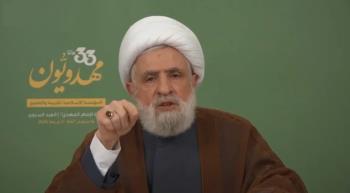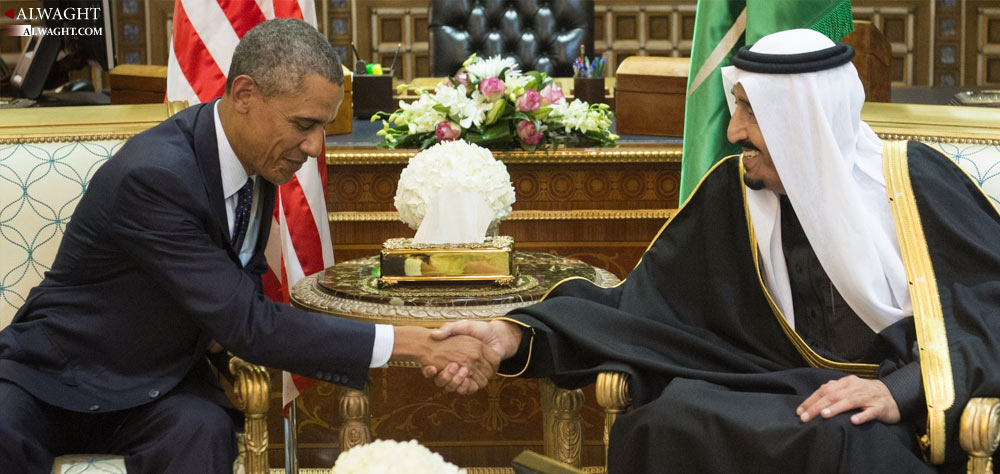Alwaght- Following collapse of the Soviet Union in the 1990s and Washington's feeling of relaxation from supervision of the Eastern Bloc's red lines in Europe, the US shifted obsession toward the West Asia region. In order to define new adversaries to keep the NATO standing, keep its military industries alive, dominate the main gas and oil sources of the world, and save its hegemony, the US needed West Asia.
With this outlook for the region, the September 11, 2001 attacks presented Washington with proper excuses to intervene in its new region of focus. The American leaders' justification for military campaigning and building new military– and political– bases in the region was an aim to pre-emptively confront the Taliban and Al-Qaeda terror groups, as well as Saddam Hussein of Iraq.
Meanwhile, Saudi Arabia, acting as key Arab ally of the US in the region, supposed that by contributing to materialization of the American ends in West Asia it could also achieve a couple of its objectives that will guarantee its interests.
Military and security aspects
After removal of Saddam Hussein's dictatorship and establishing a democratic political system in Iraq in 2003, the Saudis began to raise concerns about rise of a Shiite-controlled government in the country as the Shiite population of Iraq accounted for 60 percent of the country’s population. When in post-Saddam Iraq Nouri al-Maliki became the prime minister, the Saudi rulers immersed themselves in a kind of illusion the result of which was disruption of the order in the region. Actually, after developments in Iraq, the Saudi Arabian leaders inferred that the “Shiite Crescent”, a supposed political belt that starts from Iran and covers Iraq, Yemen, and Syria, and ends in Lebanon, was nearing its completion. For them, this meant Tehran will solidify its sway in the region. This process, in their eyes, needed to be interrupted. Damaging the domestic order of Iraq could serve the aim of blocking Iran’s further power gain.
Additionally, the Al Saud rulers were optimistic that through work with the US and guaranteeing the Israeli regime’s security they could appease the West in case it wanted to raise concerns about issues inside the kingdom such as human rights, democracy, and freedom of speech. First Saudi monarch seized the power through subduing other tribes in the Arabian Peninsula. A fear of uprising by the dissenters pushed the Saudi kings in different periods of time to crack down on the country’s political atmosphere.
A strict interpretation of Islam– majorly affected by the Wahhabist ideology– along with an iron-fist approach in dealing with the citizens and political activists have made the Saudi leaders stay alert and sensitive to any movements that stepped out of line of their established codes of behavior. In such conditions of worry, siding with Washington could present a guarantee to keep the royal family ruling in Riyadh.
This approach was in place until eruption of the Islamic Awakening, a set of sweeping uprisings that covered the West Asia and North Africa since 2011. In fact, the second decade of the new millennium was opened by a domino effect of the Arab revolutions that toppled some governments, majorly in Tunisia and Egypt. Amid a resultant instable atmosphere in the Arab world, the kingdom intensified its activities.
According to some documents published by the whistle-blower website WikiLeaks, Al Saud leaders in 2012 established a joint military committee with Qatar and Turkey, conspiring to overthrow the Syrian government through equipping the armed groups rising against the President Bashar al-Assad of Syria. Moreover, some other revealed top secret documents appear to suggest that the Saudis since the initial stages of the Syrian crisis took a special attention to providing Damascus's opposition forces with military supplies.
In connection with this case, Robert Fisk, a British writer and journalist, wrote an article in The Independent saying that Saudi Arabia by its billions of dollars of bankrolling played a crucial role in creation of the ISIS terrorist group. The Saudi leaders are continuing their funding for the ISIS as part a support plan.
Economic and military aspects
The Saudi-American ties in the new century have not been restricted to Riyadh contribution to an ambitious Washington plan to set up the “Greater Middle East.” Military dealings accounted for a major part of bonds between the two allies. Because the US, as a capitalist nation run on a private sector investment, to raise budgets needs the tax paid by its industries and incorporates. Accordingly, the White House's policies that aimed at bolstering the private sector and its activities worked in favor of an increase in the government’s power of maneuvering. So owning greatest military industries in the world, the US announced one of its foreign policy goals to be facilitation of arms sales.
This means that any government in Washington that can sell more weapons than its predecessors, in addition to pushing down the unemployment rates can help increase the tax incomes. It was for this reason that only a year after Obama won the election and became president, the US signed the largest arms deal in its history. The purchaser of arms was Saudi Arabia.
According to the contract, Pentagon went under commitment of supplying Saudi Arabia with $60 billion worth of military equipment including F-15 fighter jets, choppers, missiles, bombs, launching pads, early-warning flying radar systems, as well as night-vision cameras in a decade-long period.
The kingdom as one of the major buyers of the American military equipment and an enforcer of Washington’s policies in the past 80 years of its life occupies a special place in the eyes of the White House's strategists. Such a significance is what the Saudi monarchs one after another during long years of their rule strove after.
On the other side, the strategy of pivot to Southeast Asia that was put forward in Obama administration’s time, according to some analysts, meant a Washington's defocus from the West Asian cases. However, the importance of energy in the eyes of the circle of Washington’s rivals, guaranteeing the sustainable Israeli security, and most importantly the region's arms markets show that despite plans for relocating focus to the Southeast Asia and China developments, the US does not want to withdraw from West Asia or even allow other actors get foothold there, especially that implementing the so-called Greater Middle East plan remains an integral option of its strategies.
In 1980, while the Iraqi war against Iran was under way, Zbigniew Brzezinski, then the US national security advisor, argued that the crucial problem the US was facing was that it did not know how to fan new war in the Persian Gulf region to, on the sidelines of the Iraqi-Iranian war, help it amend the Sykes-Picot Agreement.
Well aware of its name on the US list of must-split countries according to the Greater Middle East strategy, the kingdom struggled to promote its place in the American foreign policy in a bid to steer clear of undergoing the partition process as an old ally of the US, and at the same time seize the opportunity to transform to a leading and indispensable power in the region.
With this idea in mind, Riyadh’s officials in the recent years– and in time with beginning of a plan to split the regional countries starting with North African countries and continuing to Syria and Iraq– Saudi Arabia started activism to upgrade to a US pawn in the region.
Strengthening and publicizing ties with the Israeli regime, trying to offer guarantees for Tel Aviv’s security through seeking ownership of the two Red Sea islands of Sanafir and Tiran of Egypt, and pressing the Persian Gulf Arab states for opening Israeli embassies in their capitals have been part of the Al Saud government's pro-US strategy measures. Furthermore, with 267.91 billion barrels of confirmed oil reserves which account for one fifths of the global oil reserves, Riyadh hopes to play a vital role in the American geo-economic programs.
It was because of this Saudi importance for the American national interests that the US President Barack Obama a couple of months ago vetoed the Congress's Justice Against Sponsors of Terrorism Act (JASTA) which allows the US victims of the 9 /11 attacks to sue Saudi Arab and which could damage the Washington-Riyadh relations. He called the congressional motion as politically-motivated, emphasizing that the Bill could bring forth serious consequences for the US.
On the other side, Riyadh rejected the legislature and threatened if the draft was passed into law, the kingdom will withdraw assets worth $750 billion from the US economy. But the motion finally became law following Senate’s approval, though due to the above-mentioned reasons there is no hope of its enforcement.
In fact, it is no surprise that Obama and friends are worried about the anti-Saudi bill enforcement, as blaming Riyadh in addition to impairing its position in the region as a Washington's ally can lay bare the White House’s behind-the-scenes power game.



























